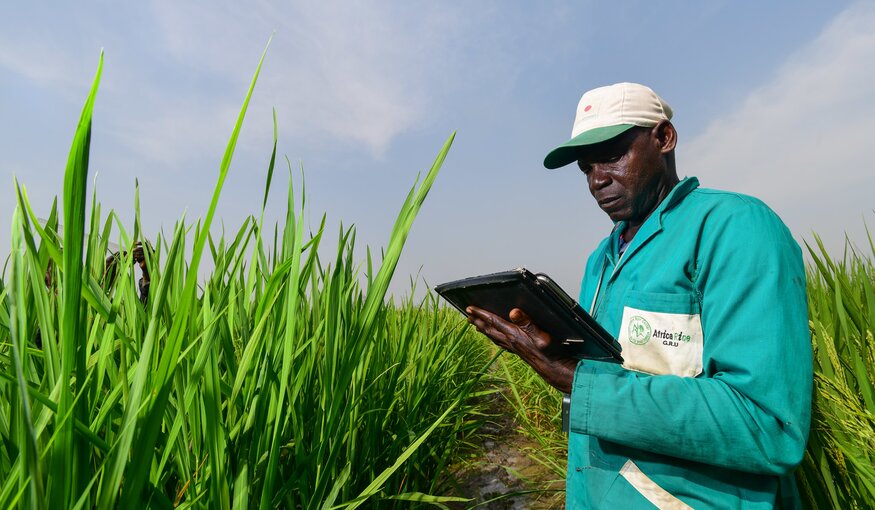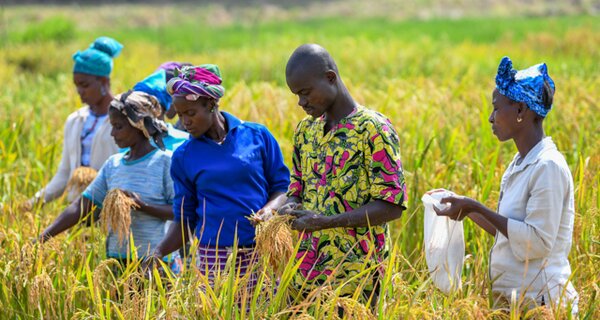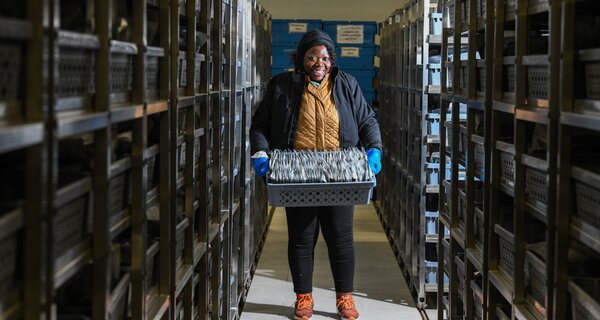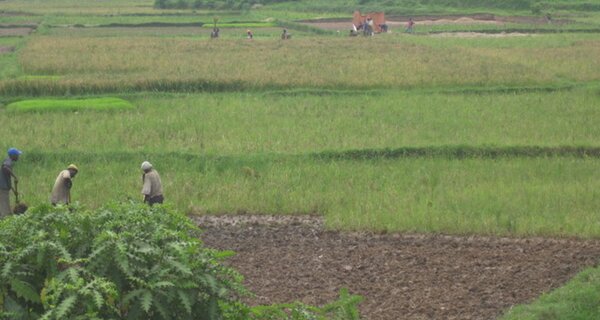Long-Term Funding Supports AfricaRice Genebank and the Future of Rice Diversity

29 August 2025
Partnership ensures farmers and breeders have lasting access to the crop’s diversity.
Bonn, Germany, 29 August 2025 – Over 35 million smallholder rice farmers across Africa stand to benefit from the agreement signed last month between the Crop Trust and the Africa Rice Center (AfricaRice) to safeguard the crop’s future in the region.
The agreement with AfricaRice – a CGIAR research center established in 1971 – secures long-term financial support for the essential operations of its genebank in Côte d’Ivoire, which holds Africa’s largest rice collection. The agreement is financed through the Crop Trust Endowment Fund to ensure the conservation and use of the crop’s diversity across Africa in perpetuity.
A dietary staple in 40 of Africa’s 54 countries, rice feeds and employs millions. Demand is rising by almost 6 percent each year – faster than for any other staple crop – driven by population growth, urbanization and shifting tastes. In Sierra Leone, Liberia, Guinea, Senegal, Côte d’Ivoire, Ghana, Nigeria and Madagascar, it is eaten almost daily. It anchors national dishes and forms the base for countless local sauces and stews. Reliable availability and adaptability make it a cornerstone of both everyday meals and festive occasions.
However, Africa imports roughly a third of the rice it consumes, and climate change, pests, and loss of diversity in farmers’ fields increasingly threaten the continent’s rice production.
The Crop Trust’s support will provide AfricaRice with sustained resources to protect and promote its collections of Asian, African and wild rice diversity. It will improve efficiency in everyday genebank activities and increase the availability of rice diversity to researchers and farmers. This funding ensures the long-term preservation and management of the rice collections in line with the highest international standards, with the aim of making rice diversity available – to develop higher-yielding, nutritious, and climate-resilient varieties in sub-Saharan Africa. AfricaRice will leverage AI to manage information on seed and conservation conditions in real time, optimize seed regeneration schedules and seed longevity, and make it easier for breeders and researchers to select good quality materials they need.
AfricaRice becomes the fourth genebank in the world to meet the rigorous standards required for a Long-Term Partnership Agreement with the Crop Trust. Other genebanks with a similar partnership are the International Institute of Tropical Agriculture (IITA) in Nigeria, the International Rice Research Institute (IRRI) in the Philippines and the Alliance of Bioversity International and CIAT in Colombia.
The AfricaRice genebank is located at the institute’s main research station in M’be, a village in northeastern Côte d’Ivoire. It is the only one in the world conserving both African rice (O. glaberrima) and its wild relatives at scale. These species carry unique traits that are vital for breeding more resilient rice varieties.
With more than 21,000 rice seed samples in its cold rooms – 85 percent of which originated in Africa – it is the third-largest rice genebank in the world.
The AfricaRice genebank has played a direct role in developing many rice varieties used by the continent’s farmers today. These include NERICA (New Rice for Africa) varieties, hybrids combining the high yields of Asian rice with resilience traits from African rice, and ARICA (Advanced Rice Varieties for Africa), which are particularly adapted to West and Central Africa.
The NERICA varieties have lifted 8 million people out of poverty and food insecurity in 16 African countries. They have significantly increased on-farm yields and boosted farmers’ incomes. These successes highlight the importance of safeguarding crop diversity, without which modern varieties wouldn’t exist.
AfricaRice not only conserves seeds but also ensures their use benefits farmers. It has distributed more than 38,000 samples in the past decade to international research centers, universities, national agricultural research systems and non-governmental organizations. A specially selected set of samples of African rice called a core collection, which brings together maximum diversity in a relatively small subset of the collection as a whole, was sent to 17 countries in the past five years. Discover more about AfricaRice’s genebank collection by browsing Genesys.
Safeguarding this diversity today will help keep rice fields productive and resilient across Africa and around the world for generations to come.
Dr Stefan Schmitz, Crop Trust Executive Director, said:
“We are proud and excited to be entering into this Long-Term Partnership Agreement with AfricaRice, marking our fourth since the first one with IRRI in 2018. The Crop Trust is making this commitment to ensure that the vital work of AfricaRice’s genebank continues with the necessary resources to operate effectively. The generous support that our Endowment Fund receives from donors around the world is crucial to climate-proofing our agri-food systems and dealing with unforeseen threats to genebanks and the crop diversity that they hold in trust for humanity.”
Dr Baboucarr Manneh, AfricaRice Director General, said:
“As a 20-year veteran at AfricaRice, and as a rice breeder for five years before that, I am acutely aware of the challenges that scientists, farmers and seed producers grapple with on a warming planet. This partnership with the Crop Trust means that our genebank will be able to continue its mission of conserving and making available our rich reservoir of genetic resources in perpetuity. We look forward to a fruitful partnership that builds resilience to the many challenges that our food systems face across Africa and beyond.”
Dr Sarada Krishnan, Crop Trust Director of Programs, said:
“It is a great pleasure to welcome AfricaRice to the growing number of long-term partnerships that we have developed over the years. This agreement helps fulfill the Crop Trust’s mandate of securing the world’s crop diversity and charts a path for other key genebanks to follow. We hope our financial assistance will be a boon to a generation of rice farmers and breeders who help feed millions of people on the African continent.”
Dr Marie Noelle Ndjiondjop, Head of the Genetic Resources Unit and Manager of the Rice Biodiversity Center for Africa at AfricaRice, said:
“The significance of the Crop Trust’s ongoing support for our genebank is immense. This agreement is a vote of confidence in the work we have done over many years. The rice samples in our genebank have been efficiently maintained at a high standard and used over the years to develop modern improved varieties adapted to the different rice-growing conditions in Africa. As breeders and farmers increasingly shift their focus from disease resistance to climate resilience and grain-quality traits, AfricaRice can adapt to these evolving demands in the knowledge that the Crop Trust is standing with us. We are very grateful for its support.”
Notes to the Editor
About the Crop Trust
The Crop Trust is an international organization working to conserve crop diversity and thus protect global food and nutrition security. At the core of Crop Trust is an endowment fund dedicated to providing guaranteed long-term financial support to key genebanks worldwide. The Crop Trust supports the Svalbard Global Seed Vault and coordinates large-scale projects worldwide to secure crop diversity and make it available for use, globally forever and for the benefit of everyone. The Crop Trust is recognized as an essential element of the funding strategy of the International Treaty on Plant Genetic Resources for Food and Agriculture. Learn more at www.croptrust.org
About the Africa Rice Center (AfricaRice)
AfricaRice is one of the 12 international agricultural research centers that are members of the CGIAR Consortium. It was established under the name “West Africa Rice Development Association (WARDA)” by 11 African countries and officially began operating in 1971. The center adopted its current name in 2009 to reflect its expanded geographical focus. Today, AfricaRice’s membership comprises 28 African countries. Its mission is to deliver rice-based innovations and agri-food systems that contribute to the transformation of food, land and water systems in the face of climate change. Learn more at www.africarice.org
About CGIAR
CGIAR is the world’s largest, publicly funded agrifood research partnership. Their ambition is a food and nutrition-secure future that leaves no one behind.They operate through 15 Research Centers and with 10,000 staff in more than 100 countries. Their impact is made possible by collaboration with over 4,000 partners.
Levels of hunger and malnutrition are at record highs. Without urgent action, many more lives and livelihoods will be lost. Many of the 500 million small-scale producers who provide a third of the world’s food on 83% of the world’s farms are affected. With science, CGIAR can co-design the innovations they need to produce more and better food with fewer resources, adapt to the changing environment, and protect natural resources. Learn more at www.cgiar.org
Categories: For The Press, For Partners, Press Releases



